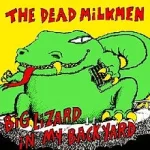How Ronald Reagan Invented Hardcore Punk
Hardcore punk had its beginnings in late 1970s California after Ronald Reagan had been that state's governor for 8 years and then narrowly lost the Republican nomination for POTUS in 1976. Nonetheless, Reagan became the nation's leading Conservative force; and by 1980, when Reagan won the White House, Hardcore suddenly erupted in the nation's captial before gradually spreading across the rest of the US, coming to a climax around the time of the Gipper's re-election in 1984 (as evidenced by the Rock Against Reagan hardcore festival).
Since Hardcore's inception there have been more hardcore songs about Reagan than any other person on Earth. There have been hardcore bands named after him. In fact it seems that if there was no Reagan, Hardcore would have even been more directionless than it is already so often portrayed to be. So the question must be raised: Does Reagan deserve some of the credit?
I was just a whipper snapper living in small town Central Illinois when hardcore began. Like most Ameriteens of the 80's, I was introduced to hardcore via the Repoman soundtrack and from mixed tapes recorded off the local college radio station. It wasn't until the summer of '85 that I experienced the punk scene in Chicago first-hand, but by that time hardcore's heyday had already been and gone. I'd never been a joiner of groups/movements, etc., anyway, but the hardcore scene I experienced seemed like just another highschool lunchroom cafeteria clique that was rather silly. There was one thing that stuck out about hardcore, though, and that was its focus/attack on Reagan. A lot of teens at the time seemed rather eager to jump on the anti-Reagan bandwagon because of his past as a Hollywood actor. There was just so much fodder (for those with teen-age humor mindsets) in which to make fun of Reagan, either due to his slicked hair or cowboy hat or co-starring roles with Bonzo the Chimp. These images and the easy quick-quips against Reagan were more understandable to kids than Reagan's actual policies and plans, but at the same time the jokes and images served as gateways into a better understanding of how the youth were being victimized by Reagan's "trickle down" economics, as well as being instrumental in focusing the hardcore teens attention on Reagan's escalation of military weaponry and the prospect that this buildup could inevitably lead to a nuclear holocaust.
Today it's hard to gauge how much Hardcore as a subculture influenced the American landscape. Some see hardcore as just a rebellious stage that teens go through. Others continue to dedicate their lives to the hardcore way. But whatever the case, its hard to think of any other modern day musical movement that is so associated with a political leader (and his ideology) as much as hardcore is with Reagan.

